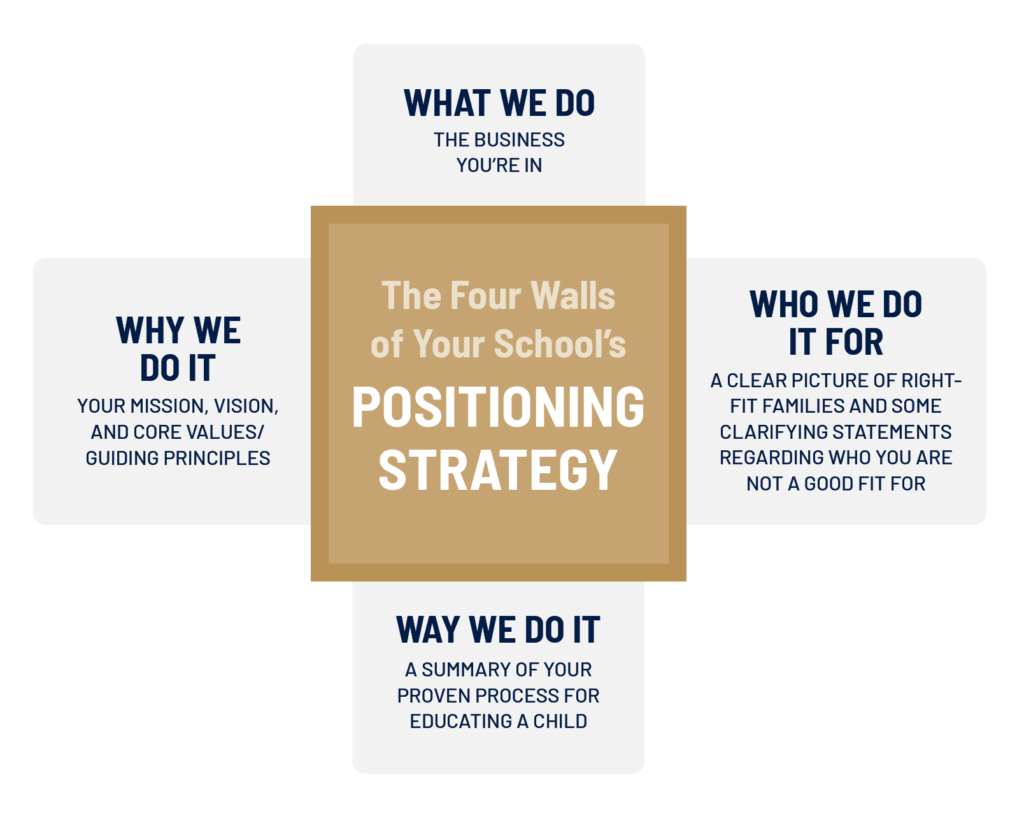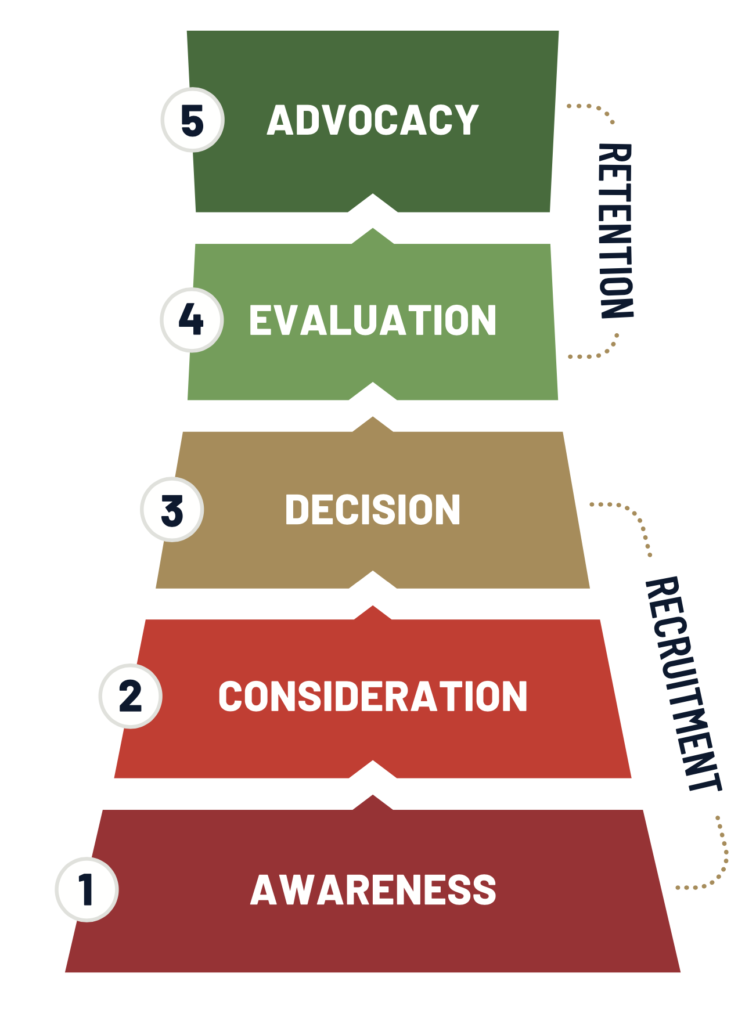As we head into Part 4 of this series, The Pursuit of Healthy Enrollment, let’s take a moment to recap.
There are marketing strategies and market forces driving families to your school. If you’re an independent or faith-based school that is full or near full, you’re probably experiencing some of the emerging complexities of full enrollment. Of course, being full isn’t always bad — it just isn’t the only goal you should be focusing on. We took a look at 8 attributes of healthy enrollment, and how enrollment health can impact key aspects of organizational life.
Now it’s time to talk about you and how your role impacts enrollment health. As a marketing or admissions professional, you have great influence in this area.

PART 4
Marketing’s Contribution
Enrollment health connects to every aspect of school life. The Board, the Head of School, classroom teachers, coaches, counselors — everyone plays a part in shaping the family experience at your school. Everyone either contributes to or detracts from enrollment health.
Let’s zoom in and focus on how the marketing and admissions team can influence the equation. There are three aspects of enrollment health that can be directly affected by team members who are responsible for attracting and retaining right-fit families.
1
A Focused School Identity
This is about more than a brand or a logo. To be clear, your logo is not your brand. Your logo is a visual representation of your brand, but it is not the summation of your school’s identity.
Your school’s identity comprises a list of decisions and commitments: what you do, who you do it for, the way you do it, and why you do it. Whether intentional or not, your school holds a position in the local community of educational options. How you answer (or don’t answer) these questions will influence the perception of your brand among current and prospective right-fit families.


Schools that think deeply about these questions and commitments will have a sharper view of what they’re about, who they’re for, their proven process for educating a child, and the collective aims of their organization.
You may think, “Sheesh, aren’t those questions a bit heady for marketing and admissions folks to work through?” Well, yes and no. Yes, in that the Director of Marketing or Director of Admissions can’t just make this stuff up. The school’s leadership needs to be engaged in the conversation. But marketing needs to be involved in these decisions.
The enrollment team needs to be clear on the school’s value proposition, which is rooted in the school’s positioning strategy. Gaining alignment around these fundamental commitments will make it a lot easier to help families understand if what the school is selling is something they want to buy.
2
An Empowered Enrollment Team
Whether your school’s marketing and admissions team is one person doing it all or several players with clearly defined roles, your contributions are essential for healthy enrollment.
Net tuition revenue comprises more than 90 percent of most private schools’ operating budgets, making recruitment and retention functions vital for sustainable operations.
Let’s explore four key areas of alignment for marketing and admissions teams:
1. Enrollment Goals
A combination of your recruitment and retention objectives for a single school year.
2. Seasonal Priorities
The handful of prioritized projects and initiatives you will see through to completion in a given timeframe.
3. Roles and Responsibilities
Tightly defined job profiles covering the primary recruitment and retention functions.
4. Rhythms and Reporting
The meeting cadence and data dashboards you use to shape priorities, set goals, track progress, and stay on track.
3
Engaged Right-Fit Families
A focused school identity and an empowered enrollment team come together in a powerful way to connect with right-fit families who are on a journey to choose and engage with the right school for their kids. This is a high-stakes decision for them; it’s not just about the money. It’s about whom they will entrust with their children’s education, safety, and future. It’s about where they will put down roots.
Engaging right-fit families requires investment in your Marketing Platform and intentional engagement throughout the Family Journey. Let’s unpack these key concepts.

Marketing Platform
Your Marketing Platform is all about being ready to receive interest from prospective families. The components include:
Branding
Your academic and athletic logos and your Brand Standards Guide, which are the visual representation of your school’s value proposition.
Messaging
The narratives you use to tell your school’s story by Age-and-Stage®.
Multimedia
The photos and videos you use to export your school’s culture.
Website
Your always-open window into your school for prospective families.
School Platforms
A commitment to a few key social channels that enable your network of followers to share your content with their friends and family.
Print and presentation collateral
The brochures and slide decks you use to unpack the school’s experience by Age-and-Stage®.
MarTech
The technology and dashboards you use to track your marketing, report results, and dial in your strategies.
Family Journey
This is the process families navigate as they discover, evaluate, enroll, and advocate for a school. Your recruitment and retention efforts should be dialed in for each phase.

recruitment
Awareness
Families ask for referrals and do research online.
Consideration
Families make calls, take tours, and shorten their list.
Decision
Families evaluate their options and make a commitment.
retention
Evaluation
Families determine if they’ve made the right decision.
Advocacy
Families share their story, whether positive or negative.
You can get there from here.
The work we’ve outlined here is not something that can be completed within a few months, but over the next few years.
It’s a long march, and that’s OK. Many of you marketing and admissions types are wired to get stuff done; you want to be all the way there ASAP. But it’s important to see this as a process, not a project.


